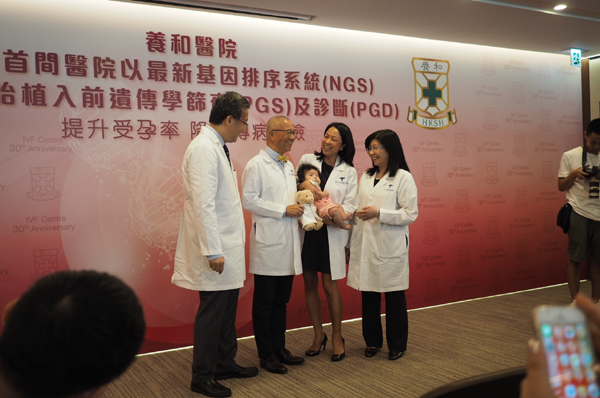HK hospital shows off pioneering gene tech baby

The first baby in Hong Kong developed from an embryo that was screened by using Next Generation Sequencing, a healthy baby girl born in January 2015, made her first public appearance at Hong Kong Sanatorium & Hospital July 27, 2016. Photo from China Daily/Asia New Network
Hong Kong’s first baby developed from an embryo that was screened by using an advanced genomic technology made her first public appearance on Wednesday at Hong Kong Sanatorium and Hospital (HKSH).
Next Generation Sequencing (NGS) was introduced in in-vitro fertilization (IVF) treatment in the city by the IVF Centre at HKSH in January last year.
NGS is adopted to substitute other conventional testing methods used in Pre-implantation Genetic Screening (PGS) and Pre-implantation Genetic Diagnosis (PGD) of embryos, with the aim of better selecting the most reliable embryos for implantation during IVF treatments.
PGS is a comprehensive chromosome screening test as part of IVF to detect the wrong number of chromosomes in embryos, helping to prevent such embryos being implanted to the uterus.
PGD, meanwhile, is deployed to specifically identify some particular types of genetic diseases like Thalassemia, says Dr Tang Oi-shan, a specialist in Reproductive Medicine of HKSH.
“With the help of NGS technology, the diagnosis of genetic diseases or chromosomal anomalies could be conducted in one go, with higher clarity and flexibility,” Tang adds.
NGS is touted as being more dependable and sensitive in identifying chromosomal defects than usual testing methods for PGS and PGD. In the pre-implantation test, doctors will pluck three to five cells from the outermost layer of the five-day-old embryo.
The cells collected will then be examined to see if they contain excess or insufficient chromosomes – a condition named aneuploidy which increases the risk of miscarriage, particularly at an advanced maternal age.
Another specialist in Reproductive Medicine of HKSH, Dr Ingrid Lok Hung, who was responsible for the first NGS baby, cautioned that the technology is not without limitations.
NGS is instrumental in embryo selection, but it cannot control other environmental factors like the health condition of the uterus during pregnancy, and cannot fix the genetic abnormalities in embryos.
Up to now, there are 25 couples enrolled in IVF treatments using NGS, among which 15 implantations have been made resulting in 11 successful pregnancies.
The mother of the first IVF baby was advised to undertake PGS through Next Generation Sequencing in January 2015. The woman gave birth to a healthy baby girl at the age of 40, despite repeated IVF implantation failures over the past decade.
NGS is considered useful to facilitate embryo selection, which in turn boosts the rate of viable pregnancy and lowers the risk of genetic diseases passing from parents to their children. TVJ